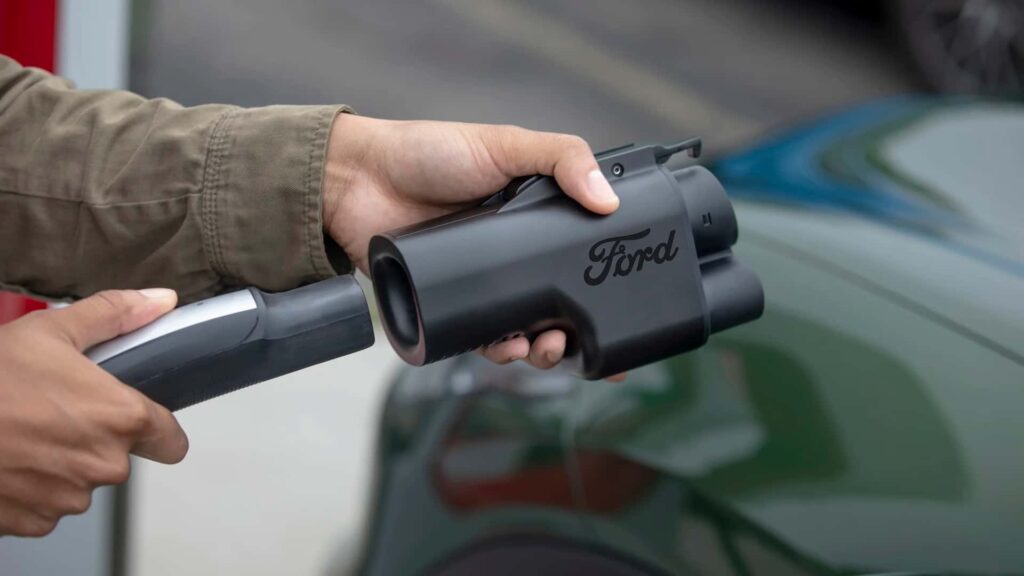The NACS-to-CCS adapter has become a crucial accessory for electric vehicle owners, especially those with Ford and Rivian EVs. This adapter allows Tesla’s charging cable to connect to EVs with CCS ports, providing access to the Tesla Supercharger network, which is considered the gold standard of charging in the U.S. auto industry.
However, the recent tariff war between the U.S. and China has put one of the suppliers of these adapters, Lectron, in a difficult position. The adapters are currently made in China, and with the U.S. imposing 104% tariffs on Chinese goods and China retaliating with 84% tariffs on American imports, the cost of production has significantly increased. In response, Lectron plans to move some of its production to Vietnam by Q3, but now faces a 46% tariff imposed by the Trump administration on Vietnamese imports as well.
Christopher Maiwald, the CEO and founder of Lectron, expressed concerns about the potential increase in costs due to the tariffs. He mentioned that even though the adapters are assembled in China, some of the materials used, such as resins for making the plastic, come from American suppliers. This could further escalate the cost of production and potentially make the adapters more expensive for consumers.
The Ford-branded NACS adapter, priced at $200, is currently available on the automaker’s website with a short shipping time of two to three days. However, if the tariffs continue to impact production costs, the price of the adapter may increase. This could be concerning for EV owners who rely on these adapters to access charging infrastructure.
Despite being a seemingly mundane piece of equipment, the NACS adapter gained popularity last year due to limited supply and high demand. Ford and Rivian EV owners eagerly awaited the adapters to enable them to road trip with ease. Additionally, an early batch of adapters made by Tesla was found to be faulty, prompting Ford to issue a recall and advise EV owners to stop using them until a replacement was obtained.
In conclusion, the tariff war between the U.S. and China has inadvertently affected the production and cost of the NACS-to-CCS adapters, potentially making them more expensive for consumers. As the demand for electric vehicles continues to grow, ensuring access to reliable and affordable charging infrastructure remains crucial for the wider adoption of EVs. Ford has announced plans to diversify its adapter supply chain by bringing in Lectron, a move that comes in response to increasing pressure from customers demanding quicker delivery of adapters. The company’s spokesperson, Maiwald, expressed the challenges faced when customers take to social media to express their impatience, stating, “When you have people live tweeting ‘Where’s my adapter?’ 20 times a day, it’s tremendous pressure.”
The decision to diversify the supply chain comes at a critical time, as production costs in China are on the rise and tariffs are inflating import prices in the U.S. This could potentially lead to higher prices for EV buyers, ultimately impacting demand. Maiwald acknowledged the potential impact, stating, “It’s too early to say what exactly the impact is. We are studying this right now. But it will definitely make stuff more expensive.” This could pose a challenge to the ongoing transition away from gas-powered vehicles towards electric vehicles.
Lectron, a supplier of NACS-to-CCS adapters, has already shipped approximately 200,000 adapters, with the majority going to the U.S. market and some to parts of Canada. This includes both the Vortex adapter and the one supplied to automakers. Despite the challenges posed by tariffs, Maiwald remains optimistic about business growth this year, although he refrained from making any specific demand forecasts. He highlighted the unpredictability of the situation, stating, “We could spend a lot of time forecasting and then an announcement gets made from the policy side. And then we spend another week reforecasting.”
Overall, Ford’s decision to diversify its adapter supply chain by roping in Lectron signals a strategic move to address customer demands and potential challenges arising from production costs and tariffs. As the demand for electric vehicles continues to rise, ensuring a smooth and efficient supply chain will be crucial for automakers to navigate the evolving market landscape.

